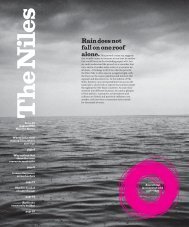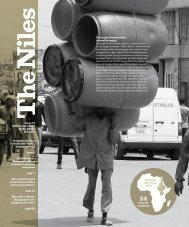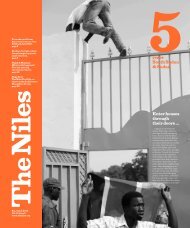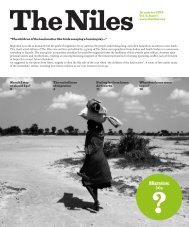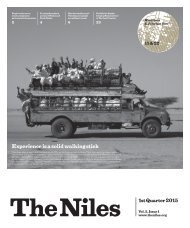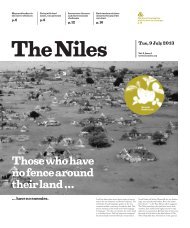When deeds speak, words are nothing
Speaking about sustainable development is easy. Acting sustainably is another matter. And now the evidence is unequivocal: Mankind’s impact on nature is causing the climate to change rapidly and drastically, threatening the environment and the very resources we need to survive. Aware that humanity is careening close to the edge, The Niles correspondents set out to explore where and how people in the Nile Basin region rethink. So much of their findings for now: We are an endlessly innovative species. Cooperation is our superpower. When deeds speak, words are nothing.
Speaking about sustainable development is easy. Acting sustainably is another matter. And now the evidence is unequivocal: Mankind’s impact on nature is causing the climate to change rapidly and drastically, threatening the environment and the very resources we need to survive. Aware that humanity is careening close to the edge, The Niles correspondents set out to explore where and how people in the Nile Basin region rethink. So much of their findings for now: We are an endlessly innovative species. Cooperation is our superpower. When deeds speak, words are nothing.
Create successful ePaper yourself
Turn your PDF publications into a flip-book with our unique Google optimized e-Paper software.
Mahmoud Yasin, a Tuti Island
farmer.
Photo: The Niles / Elzahraa
Jadallah
Elzahraa Jadallah
Khartoum, Sudan
“On Tuti,
a model
needs to be
implemented.”
“On Tuti, production is very low. They
face many challenges starting from preparing
the soil. Farmers don’t examine the soil
of their farms. In Khartoum State alone,
there are various soil types with different
properties, some with higher salt levels than
others. And farmers should do these tests
to determine what type of crops to cultivate,”
she explains.
The Ministry of Agriculture does have
a soil samples database, yet it has remained
outdated for decades, and it is expensive for
farmers to do the testing. Private sector investors
are the only ones that do this, for both the soil
and the irrigation water. In addition, the types
of seeds available are not the best, outdated and
in poor shape.
Ali says that modern cultivation methods
are essential, from preparing the soil to the
irrigation method. “It’s possible for small farmers
to develop their methods with the resources
they have if they know how to use the same
traditional tools. Then grow suitable crops,
place seeds the right way and maximise the
use of water for irrigation. On Tuti, a model
needs to be implemented so that farmers will
be encouraged to follow its example.”
Negligence of duties
Abdul Wahab explains an unknown disease
outbreak last year killed large amounts
of livestock, and there was no governmental
reaction. “Even the veterans and agriculture
experts on the island ignored this. This year
[2021], agricultural production has decreased
significantly. Big and small-scale farmers are
wondering about the reason. And the same,
no care or response.”
“In fact, the governmental bodies have
gotten worse after the revolution. The managers
changed, but the same neglecting staff members
remained. The corruption and lack of
supervision are worse now. In the same way,
the laws and regulations were not amended
or changed. Farmers have no legal protection
nor an active entity that supports them and
addresses their problems,” an official source
that prefers to stay anonymous told The Niles.
Ali says that it is difficult for farmers and
engineers to organise themselves. They can’t
form committees, for example, to lobby the
government to do its duties, change the laws,
actively supervise the activities and support the
farmers, “Sudan needs to adopt new methods
of agriculture, import modern seeds, machines
and so forth.”
In the past months, there were dozens
of deaths and other health issues related
to the unregulated use of pesticides by farmers
unfamiliar with the products, she says, adding
that these issues are neither reported by the
media nor addressed by the authorities.
Adding to the challenges facing farmers,
climate change has shifted the agricultural
calendar. “For example, in Khartoum State,
the seasonal cultivation period used to start
around October. Now it comes months earlier,
and preparations and cultivation procedures
must be made accordingly starting from June
and July. Unfortunately, farmers plant late,
meaning that crops are unlikely to thrive,”
Ali says.
Where is the government?
In addition to its neglect, the government
is raising electricity fees for farms. When it
provided designated gas supplies, it only did
so for big farming projects, exposing smallscale
farm owners to the greed of black-market
traders.
Those with limited resources must now
buy from the market, adding to expenses and
decreasing the scarce profits. “We formed
Mahmoud Yasin on his Tuti
Island farm.
Photo: The Niles / Elzahraa
Jadallah
35









